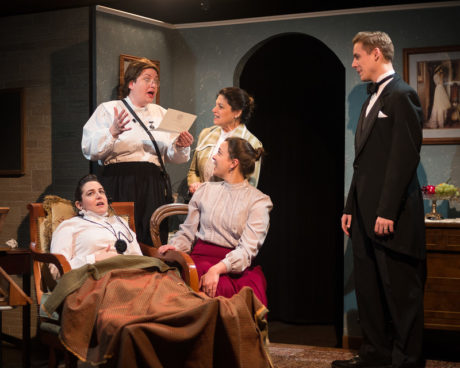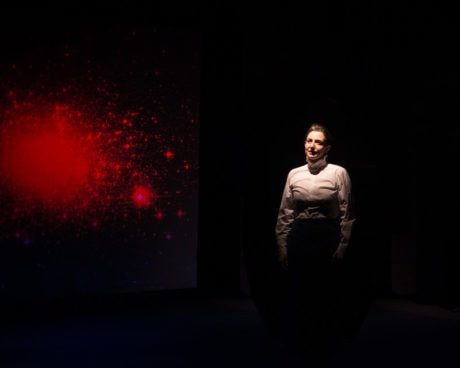Lately the news has been resignifying theater more than usual. To resignify is not a commonly used verb but it’s a commonly understood thing. It means “to give new signification to,” to alter what something means. In the case of a play, it’s when life makes art betoken more than the artist imagined. Case in point: The hauntingly moving production of Lauren Gunderson’s Silent Sky at Silver Spring Stage.

The play is about a real woman, Henrietta Leavitt, a brilliant American astronomer who in the late nineteenth century literally expanded human consciousness about how vast the universe is. She discovered a way to measure how far away stars are, at a time when astronomers thought the Milky Way (which Earth exists in like a teensy spec) is all there is. Wrong. Leavitt blazed the way to see that the universe has galaxies by the billions and it’s getting bigger. This she braved to do in a male-dominated profession decades before women had the vote.
A review by my DCMetroTheaterArts colleague Susan Brall puts the play in sharp focus and accurately praises it to the skies: “This trek into the stars will lift your soul and broaden your mind.”
But in these unsettling times, the play also bestirs consternation.

The morning I was to see Silent Sky, I spotted a news story headlined “Little girls doubt that women can be brilliant, study shows”:
A study published Thursday in the journal Science suggests that girls as young as 6 can be led to believe men are inherently smarter and more talented than women, making girls less motivated to pursue novel activities or ambitious careers. That such stereotypes exist is hardly a surprise, but the findings show these biases can affect children at a very young age.
Really, girls as young as 6 disbelieve they can be brilliant?!
So it was cool to see in the community-theater audience of Silent Sky quite a number of kids. (The play is perfect for precocious youth. There are just a couple kisses and one “damn.”) Girls and boys alike were taking in Gunderson’s smart dramatization of the life and revolutionary accomplishment of a woman whose brain would not be contained: “If we’re not finding the largest truth,” Leavitt says at one point, “then what have we spent our lives doing?”
The continuing ceiling on young girls’ confidence in their intellect is not the only news that has compounded the significance of Gunderson’s play. Though Leavitt lived in a culture that did not value women’s scientific intelligence, it did still value science.
“I have fundamental problems with the state of human knowledge,” declares Leavitt early in the play. And we see her set out determined to increase human knowledge—through findings and facts, duplicable data, with eyes wide open, looking through a lens clearly. “I specialize in what’s out there,” Leavitt says. Her breakthrough discovery allowed other astronomers to find “more sky.”
But a story now in the news dramatically resignifies Silent Sky. The cultural consensus that scientific findings matter is coming undone. Alarmingly, “alternative facts” are displacing the credibility of scientific research. Scientists across multiple fields are organizing as a protest bloc to refute lies politically motivated to undermine confidence in facts and findings. Scientific data that disproves delusions is not just being disputed; it’s being dispensed with and derided. It’s as if a dystopian dissembler-in-chief wants us to believe that Earth is the center of the universe.
This disturbing development was unimaginable in Leavitt’s time—and undreamt of when Gunderson sat down a few years ago to write a play about Leavitt’s life. Silent Sky was intended as a period piece that would speak to now about intelligence beyond gender. As written—and as performed, directed, and designed excellently at Silver Spring Stage—it inspires awe in us: Admiration for a woman who did not believe she was not brilliant, and wonder at a universe that extends far beyond what the naked eye can see.
Silent Sky is also now a period piece about a time in history when science was not yet treated as an enemy of truth. There’s no more important time to see it than right now.
Running Time: Two hours, with an intermission.
Silent Sky plays weekends through February 4, 2017, at Silver Spring Stage – 10145 Colesville Road, in Silver Spring, MD, located in the Woodmoor Shopping Center. For tickets, purchase them at the box office, or online.





